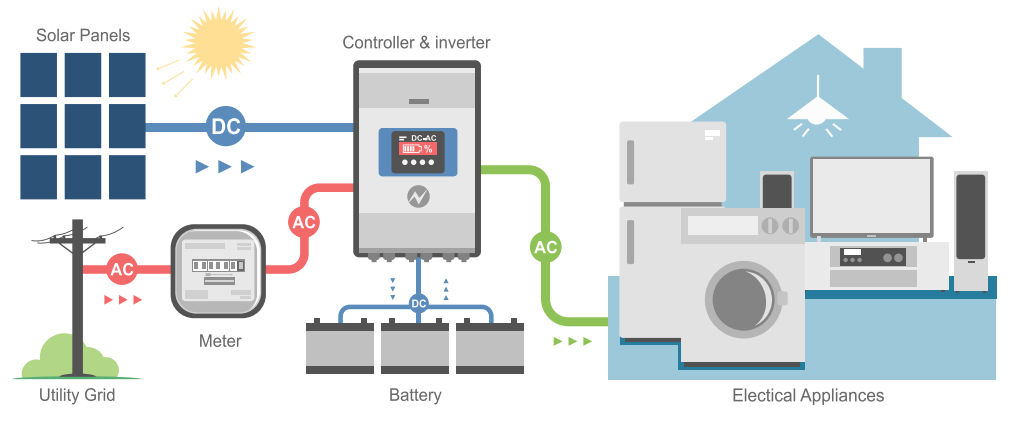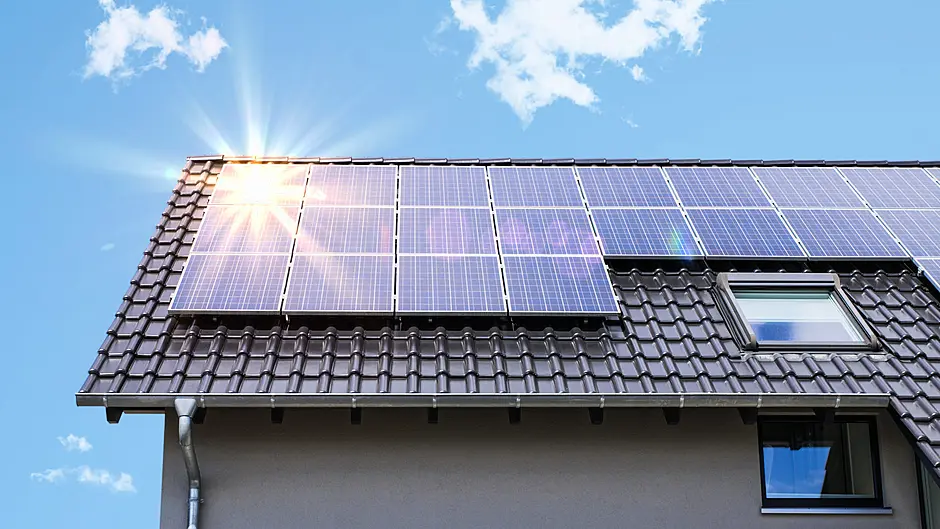With government grants, community schemes and big savings on energy costs – not to mention the positives for the environment – solar power has never been a more viable option for your home, writes Helen Riddell
SINCE solar energy is a renewable source of energy which doesn’t produce any harmful emissions, by installing a solar energy system in your home you can help to reduce your carbon footprint, contribute to a cleaner environment, improve your home’s BER rating and significantly reduce your energy costs. Solar power is energy from the sun which is converted into either thermal or electrical energy and is the cleanest renewable energy source. Even in the Irish climate with a prevalence for damp, cloudy weather, solar panels will still operate efficiently.
Solar photovoltaic (PV) panels are usually installed on the roof and capture the sun’s energy, converting it into electricity which is then used in the home. As the sun hits a solar panel it creates electricity known as direct current (DC), however homes run on alternative current (AC). The electricity needs to be passed through a device called an inverter which converts it to AC which can then be used to power your home.
There are two types of solar panels, solar PV which converts sunlight into electricity and solar thermals which convert the sun’s energy to heat your water. With solar PV, excess power generated from the panels can be sent back to the grid and in the event of any power outages you will be totally reliant on your solar energy. Solar thermals, meanwhile are solely for heating water.
The average cost of solar panel installation is between €6,000 and €18,000. However, there are a number of aspects to consider before going ahead with installation. How many are living in your property? How much hot water is generally used? What is the roof area of the property and the aspect it faces? It is advisable to contact a professional installer who will assess your home and advise if your roof structure can accommodate the panels.
It is recommended to use a professional supplier and ensure they are registered. The installation process can usually be done within a couple of days. Planning permission is not required unless your property is a listed building. Once installed, your solar panels can start generating electricity straight away. You contractor will also submit an NC6 notice to ESB networks to notify them that your connection is switching to solar power.
Solar panels are usually guaranteed to last for between 20-30 years, however, constant technological advances are seeing panels with increased lifespans, but even with a lifespan of 25 years you will recoup the installation costs and will notice a marked reduction in your electricity costs.
A West Cork solar panel installer, Paul Toolen of Toolen PV Solar Energy explains that batteries can also be used to store electricity and ‘peak shave.’ ‘If your panels are making 1kw, and you switch on your 2kw kettle, 1kw will come from the panel and one from the battery. When the kettle switches off the panel’s 1kw is free to recharge the battery.’ He also advises using batteries where there is a critical need, if you are reliant on medical equipment or if you work from home, or your water supply is via a well which requires a pump. Paul says that the most common installations are on roofs, however, if you require a larger number of panels they can be installed on a ground mount. ‘We use a method to pin the frame to the ground without concrete.’
To help towards the cost of installing solar panels, the Sustainable Energy Authority of Ireland (SEAI) offers two grant options for homeowners. A solar PV grant which is capped at €2,400 and a solar hot water grant which is capped at €1,200. The SEAI provides a one-stop shop facility which will manage the entire process for you, from the initial assessment of your home to applying for the grant for your project, assigning a registered contractor and arranging for a registered BER assessor to complete your post-works BER assessment and issue a certificate.
If a number of people in your local community are interested in saving energy, it could be worthwhile to come together to form a community energy group. The SEAI run a Sustainable Energy Community Programme which assists communities to work together to achieve their energy goals. Funding of between €10,000 to €25,000 is available to develop an energy master plan, which is supported by a local SEAI approved mentor. Locally, a group in Clonakilty established ClonEnergy 2020 which aims to enable the transition of Clonakility and surrounding areas to energy neutrality through renewable energy. The group have worked to upgrade both public and private buildings to renewable energy. The Bere Island Sustainable Energy Group secured funding to create their own energy master plan in a bid to reduce the island’s carbon footprint and move to using renewable energy sources.
By installing solar panels in your home, you’ll not only be saving money but helping to create a cleaner, greener economy and society.









